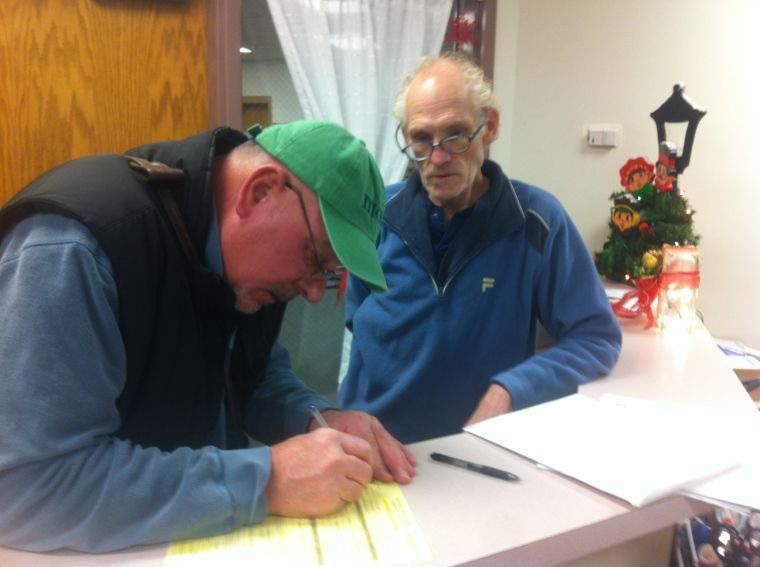Some information may be outdated.
Advocates for same-sex marriage in Moab are optimistic following a decision by a federal court of appeals that struck down Utah’s gay-marriage ban.
“I’m delighted with the news,” said Sallie Hodges, executive director of Moab Pride. “This brings us one step closer to equality.”
“I’m very happy with it,” Moab resident Thomas Ehmer said.
Ehmer, and Kym Packard, his partner of 35 years, were the first same-sex couple to receive their wedding license in Grand County. They received it on December 22, 2013, two days after federal district judge Robert Shelby struck down Utah’s anti-gay-marriage laws and constitutional amendment.
Seventeen days later, the Supreme Court temporarily reinstated the ban, giving the State of Utah time to file an appeal in federal court. This left Ehmer, Packard, and other married same-sex couples in Moab and the rest of the state in limbo.
“You wait until the law changes to do what you’ve always wanted to do, only to see it invalidated,” Ehmer said.
On Wednesday, June 25, the U.S. Tenth Circuit Court of Appeals, in a 2-1 decision, ruled that “a state may not deny the issuance of a marriage license to two persons, or refuse to recognize their marriage.”
Utah Governer Gary Herbert, in a statement issued after the ruling, said he is “disappointed with the decision from the Tenth Circuit Court of Appeals in regards to same-sex marriage. I believe states have the right to determine their laws regarding marriage. I am grateful the court issued a stay to allow time to analyze the decision and our options. But as I have always said, all Utahns deserve clarity and finality regarding same-sex marriage and that will only come from the Supreme Court.”
“Once the Supreme Court rules, every gay person in America should send a big thank you card to Governor Herbert for pushing it all the way to the Supreme Court,” Ehmer said.
Moab resident Jessica Turquette said that the court’s ruling “feels great,” but that it has taken too long.
“This is bittersweet,” she said. “The fight for minority rights always takes longer than it should. I can’t wait until we no longer refer to marriage between two people of the same gender as gay marriage and start calling it marriage.”
She and her partner Kaye Davis have been together for 15 years, and they have been on a long road to see their commitment to one another validated in the eyes of the state. In 2007, when California became one of the first states to allow same-sex marriage, they went there to get married. Then voters passed Proposition 8, which amended the state constitution to ban same sex marriage.
“We were going to sue the State of California to be reimbursed for our wedding expenses,” she said.
The Proposition 8 battle waged on in court for years and it wasn’t until August of 2013 that the California State Supreme Court finally, and unanimously, rejected the challenge by Proposition 8 proponents.
Turquette said that out of the seven years since they received their marriage license, it has only been valid for one, and that in Utah, their marriage was only considered legitimate for 17 days.
Moab City Council member Gregg Stucki said he believes that governments do not have the power or authority to rule on same-sex marriages.
“The institution of marriage, just like the family unit, predates government,” he said. “It’s definition is a component of Natural Law. Therefore, no political group or governmental agency has the authority to redefine, alter or abolish what it did not create.”
Last October, Stucki cast the lone dissenting vote against the creation of a Mutual Commitment Registry that allowed same-sex couples to be eligible for benefits through an employer; allow for visitation at health care facilities, or access city-owned and operated facilities in the same manner as a spouse or a child.
“People don’t need government to grant them permission to be involved in meaningful relationships, Stucki said. “And there are ways to seek the benefits same-sex couples desire, without unraveling and or undermining traditional marriage.”
Others see the issue to be clearly in the hands of the federal government, and that with this most recent ruling, there will be little chance of returning it to the states.
Local attorney Steve Russell said that this ruling is huge and that it illustrates an irreversible trend.
Attorney Christina Sloan agreed.
“I predict that by this time next year, same-sex marriage will be legal throughout the country,” Sloan said.
At this point, the State of Utah has two options. It can ask for a re-hearing from the Tenth Circuit Court of Appeals, or it can take the case to U.S. Supreme Court. The Supreme Court doesn’t usually hear cases that haven’t received conflicting rulings from appellate courts.
“They may take this one because it is such a hot issue,” Sloan said.
In either case, it could take up to a year before a final ruling is handed down.
In the meantime, Hodges said she would like people to know that Moab Pride will be opening a walk-in center that will provide information, help and support to those identifying as LGBTQ in the Moab community. The center will be housed in the Moab Valley Multicultural Center, 156 N. 100 West. It will be open on Mondays from 10 a.m. to 4 p.m.
“We want to create visibility, acceptance, and understanding of diversity in the LGBTQ community,” Hodges said. “What we are talking about here is love, and the right to love who we want.”
“I can’t wait until we no longer refer to marriage between two people of the same gender as gay marriage and start calling it marriage.”
State prepared to take gay-marriage ban all the way to Supreme Court
Appreciate the coverage? Help keep local news alive.
Chip in to support the Moab Sun News.





